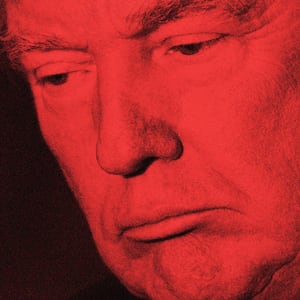“Why isn’t Donald Trump under arrest yet?”
That’s a question I hear almost daily from listeners to my SiriusXM radio show. And they’re 100 percent correct. Donald J. Trump faces his impeachment trial in the Senate this week, and that is good and necessary. But he should already be facing criminal charges arising from his incitement of the deadly attack on our Capitol, plus federal campaign finance crimes he committed with his former fixer Michael Cohen. Remember “Individual 1”? (There’s also Trump’s possible crimes for intentionally lying to the public about the risks of COVID-19 because he believed it helped him politically.)
Trump being charged with crimes is not some progressive fever drive. It’s what justice demands.
Let’s start with the simpler of the two cases, the election crime, since it’s already laid out by federal prosecutors in connection with Trump’s “hush money” payments to Stormy Daniels. In the sentencing memo submitted by prosecutors in Southern District of New York in Cohen’s case, they explained that Cohen “acted in coordination and at the direction of” individual number one, who is indisputably Trump. That means Trump committed a felony as part of a criminal conspiracy that violated federal campaign laws. Indeed, this is one of the crimes that resulted in Cohen being sentenced to three years in prison.
Former federal prosecutor Glenn Kirschner explained to me that the delay in Trump being charged with felony level federal election crimes may only be temporary. Kirschner noted that the Southern District of New York prosecutors may “be waiting for Merrick Garland—Joe Biden’s Attorney General nominee—to get in place so they can begin to pull the trigger on indictments.” Let’s hope this is simply justice delayed, not denied.
Now let’s talk Trump’s crimes arising from the deadly insurrection. Given Trump’s conduct leading up to Jan. 6, his actions that day and the countless people who have stated they attacked the Capitol because Trump incited them, Trump should already be charged with the federal crime of “inciting an insurrection” and possibly “seditious conspiracy.”
The relevant part of the seditious conspiracy statute makes it a felony if two or more people agree to “use force to prevent, hinder, or delay the execution of any law of the United States.” In this instance, the crime occurred when Trump supporters—incited by Trump—delayed the execution of the federal law that mandated Congress meet on Jan. 6 at 1:00 that day to certify the electoral results.
In fact, Kirschner shared that, “I think that all of my friends and colleagues at the DC U.S. Attorney’s office are working night and day to build a seditious conspiracy case, and incitement to insurrection case against Donald Trump.” They should be.
I encourage people to read the “Statement of Facts” portion of the House impeachment managers’ brief filed Tuesday that lays out more than just the grounds to convict Trump in the impeachment trial—it makes a compelling case to charge Trump with at least insurrection. While the House managers, headed by Rep. Jamie Raskin, do not cite the federal statute for this felony given that the impeachment trial is not criminal, they lay out the roadmap for prosecutors to build a case.
One of the most important points they make is that Trump’s misconduct is not solely about the words of his January 6 speech before the attack. Instead, they argue in powerful detail that Trump laid the groundwork for the insurrection over a period of months beginning with his repeated comments during the campaign that “the only way we’re going to lose this election is if this election is rigged.” Trump was priming his supporters to be on board with this concept if he lost the election.
From there, the House managers highlight Trump’s post-election lies about the election being “stolen” through his call for his most rabid supporters to gather in Washington, D.C.—not on any random day, but on the very day federal law mandated Congress meet to certify the election results.
The House managers’ brief leaves you with the sense that Trump radicalized some in his base —like ISIS does--with a non-stop drumbeat of lies and fiery rhetoric intended to incite them to the doorstep of violence. And finally, on Jan. 6, Trump pushed them through that door, activating them to use force to stop the certification.
In fact, the House managers—without invoking the word “radicalization”—lay out that very concept in this passage of their brief: “By the day of the rally, President Trump had spent months using his bully pulpit to insist that the Joint Session of Congress was the final act of a vast plot to destroy America.” They added, “As a result— and as had been widely reported—the crowd was armed, angry, and dangerous…Incited by President Trump, his mob attacked the Capitol.”
The House managers also emphasis that during the attack, numerous Trump supporters declared via livestream videos that they were there because Trump incited them. For example, they write, one “declared that ‘[o]ur president wants us here. We wait and take orders from our president.’ Yet another rioter yelled at police officers, ‘[w]e were invited here...by the President of the United States!’”
That sentiment is echoed up the countless others who directly point to Trump for inciting their attack on the Capitol. They are correct. The only reason they were even in Washington on Jan. 6 was that Trump repeatedly urged them to be there for a “wild” time.
The impeachment trial this week is step one—but even if Trump is convicted, accountability for Trump’s crimes cannot simply be disqualifying him from running from office again. Accountability can only come if Trump is criminally charged and fully prosecuted. That’s the best hope we have at preventing Trump or any future president from engaging in the same dangerous and illegal conduct. In fact, today would be a great day to arrest Trump.






